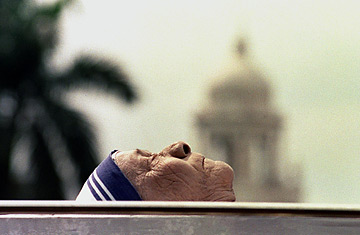
Mother Teresa's body lies in state during her funeral, Sept., 13, 1997.
"Dying is easy. Parking is hard." Art Buchwald's little witticism nicely captured his chosen path to a good death: mocking it to the very end. There is great courage and dignity in that, which is why Buchwald's extended goodbye (he died on Jan. 17) earned him such appreciation and admiration. But dying well is also a matter of luck. By unexpectedly living almost a full year after refusing dialysis for kidney failure, Buchwald won himself time to taunt the scythe.
Timing is everything. When former Congressman—and distinguished priest and liberal luminary—Robert Drinan died earlier this year, the Washington Post published a special appreciation. It ran together with a tribute to another notable who died just one day later: Barbaro. The horse got top billing. And does anyone remember when Mother Teresa died? The greatest saint of our time died on the frenzied eve of the funeral of the greatest diva of our time, Princess Di. In the popular mind, celebrity trumps virtue every time. And consider Russian composer Sergei Prokofiev, tormented in life by Stalin, his patron and jailer. Prokofiev had the extraordinary bad luck of dying on the same day as the great man, "ensconcing him forever in the tyrant's shadow," wrote critic Sarah Kaufman of the Washington Post, "where he remains branded as a compromised artist."
We should all hope to die well. By that, I don't mean in the classic Greek sense of dying heroically, as in battle. I'm suggesting a much lower standard: just not dying badly. At a minimum, not dying comically—death by banana peel or pratfall or (my favorite, I confess) onstage, like the actor Harold Norman, killed in 1947 during an especially energetic sword fight in the last scene of Macbeth.
There is also the particularly unwelcome death that not just ends a life but also undoes it, indeed steals it. The way Kitty Genovese's was stolen. On March 13, 1964, she was repeatedly stabbed for 35 minutes in the street and in the foyer of her apartment building in Queens, N.Y. Many neighbors heard her scream. Not one helped. When the police eventually arrived, it was much too late. Her death became a sensation, her name a metaphor for urban alienation, her last hour an indictment of the pitiless American city.
I've always been struck by the double injustice of her murder. Not only did the killer cut short her life amid immense terror and suffering, but he defined it. He—a stranger, an intruder—gave her a perverse immortality of a kind she never sought, never expected, never consented to. She surely thought that in her 28 years she had been building a life of joys and loves, struggle and achievement, friendship and fellowship. That and everything else she built her life into were simply swallowed up by the notoriety of her death, a notoriety unchosen and unbidden.
That kind of double death can also result from an act of God. Disease, for example, can not just end your life; if it is exotic and dramatic enough, it can steal your identity as well. Without being consulted, you become an eponym. At least baseball great Lou Gehrig had the time and talent to be remembered for things other than what was generally known as ALS (amyotrophic lateral sclerosis). Ryan White, a teenager when he died in the early years of the AIDS epidemic, did not. He was hastily conscripted as poster boy for the Ryan White Comprehensive AIDS Resource Emergency (CARE) Act—defined by his dying, much like poor Megan Kanka, the little girl murdered by a sex offender in New Jersey, who lives today as Megan's Law.
No one grasps more greedily—and cruelly—the need for agency in death as does the greatest moral monster of our time: the suicide bomber. By choosing not only the time and place but the blood-soaked story that will accompany his death, he seeks to transcend and redeem an otherwise meaningless life. One day you are the alienated and insignificant Mohamed Atta; the next day, Sept. 11, 2001, you join the annals of infamy with all the glory that brings in the darker precincts of humanity. It is the ultimate perversion of the "good death," done for the worst of motives—self-creation through the annihilation of others. People often denounce such suicide attacks as "senseless." On the contrary, they make all too much malevolent sense. There is great power in owning your own death—and even greater power in forever dispossessing your infidel victims of theirs.
